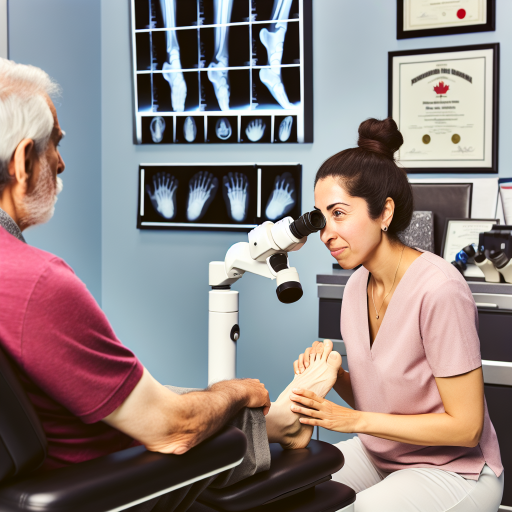Introduction to Kinesiology and its Importance in Wellness
Kinesiology is the study of human movement and its impact on health.
This discipline enhances both mental and physical wellness.
By understanding movement, we can improve our overall quality of life.
The Connection Between Movement and Wellness
Regular physical activity benefits our bodies and minds.
It reduces stress and enhances overall mental health.
Moreover, movement promotes better sleep and energy levels.
Consequently, this leads to improved mood and cognitive function.
Principles of Kinesiology
Kinesiology incorporates principles from biomechanics, physiology, and psychology.
These principles help us understand how to optimize health through movement.
Furthermore, kinesiology practitioners assess individual needs and strengths.
This tailored approach supports personalized wellness strategies.
Kinesiology Practices and Techniques
Practitioners employ various techniques to enhance wellness.
These techniques can include strength training, flexibility exercises, and aerobic activities.
Each of these components plays a role in overall health.
Additionally, mindfulness and relaxation techniques are vital for mental wellness.
Benefits of Kinesiology in Everyday Life
The benefits of kinesiology extend into daily activities.
By incorporating movement into routine tasks, we increase our energy levels.
This practice can also alleviate pain and improve posture.
Additionally, movement can foster social connections through group activities.
Embracing Kinesiology for a Healthier Future
Embracing kinesiology can transform our lives for the better.
By prioritizing movement, we promote physical and mental wellness.
This leads to a healthier, more fulfilling life.
The Connection Between Physical Activity and Mental Health
Understanding the Impact of Exercise
Physical activity plays a crucial role in mental wellness.
It boosts endorphins, which help alleviate stress and anxiety.
Moreover, exercise improves mood and enhances overall emotional health.
Unlock Your Career Potential
Visualize a clear path to success with our tailored Career Consulting service. Personalized insights in just 1-3 days.
Get StartedData shows that individuals engaging in regular physical activity report higher life satisfaction.
The Role of Kinesiology
Kinesiology connects physical movement to emotional and mental health.
This field of study employs exercise techniques to support mental health therapies.
Kinesiologists create personalized movement plans tailored to individual needs.
These plans not only improve physical fitness but also promote psychological resilience.
Benefits of Regular Movement
Engaging in physical activity regularly offers numerous benefits.
- It reduces symptoms of depression and anxiety.
- It provides a sense of achievement and boosts self-esteem.
- It facilitates better sleep, contributing to improved mood.
Additionally, regular exercise fosters social connections through group activities.
Integrating Mind and Body Practices
Mind-body practices enhance the exercise experience.
Techniques like yoga and tai chi promote mental clarity and relieve stress.
These practices encourage awareness of body movements alongside mental focus.
Consequently, they foster a sense of tranquility and relaxation.
Finding the Right Activities
Different activities resonate with different individuals.
Some may prefer high-intensity workouts, while others benefit from gentle exercises.
Exploring various exercises helps individuals find what suits their mental and physical needs.
It’s crucial to pay attention to one’s body and mind during this process.
How Kinesiology Practices Promote Physical Wellness
Enhancing Movement Quality
Kinesiology improves movement quality through targeted exercises.
These exercises focus on proper biomechanics and body mechanics.
Individuals learn how to perform movements safely and effectively.
This reduces the risk of injuries significantly.
Moreover, better movement quality enhances overall physical performance.
Supporting Injury Recovery
Kinesiology plays a vital role in rehabilitation from injuries.
Professional kinesologists create personalized recovery plans.
These plans often include strength training and flexibility exercises.
Through these methods, clients can regain strength and mobility.
Furthermore, kinesiology helps reduce pain associated with injuries.
Boosting Physical Fitness
Kinesiology contributes to improved overall fitness levels.
It focuses on strength, flexibility, and endurance training.
Regular participation in kinesiology programs encourages consistent activity.
This leads to better cardiovascular health and muscle tone.
Ultimately, increased fitness levels enhance one’s quality of life.
Promoting Stress Reduction
Kinesiology practices offer effective stress reduction techniques.
Physical activities, such as yoga and tai chi, are integral components.
These activities promote relaxation and mental focus.
Additionally, they help in releasing endorphins, the body’s natural mood lifters.
With reduced stress levels, individuals experience greater physical and mental clarity.
Encouraging Healthy Lifestyle Choices
Kinesiology encourages individuals to adopt healthier lifestyle habits.
Professionals often provide nutrition and wellness guidance.
They emphasize the importance of regular physical activity.
By promoting holistic wellness, kinesiology fosters sustainable health practices.
In turn, this leads to long-term improvements in well-being.
See Related Content: The Growing Demand for Dentists Across Canada
The Role of Exercise in Reducing Anxiety and Depression
Understanding Anxiety and Depression
Anxiety and depression affect millions of people worldwide.
These conditions can significantly hinder daily life.
Understanding their impact is crucial for effective treatment.
The Influence of Exercise
Exercise plays a vital role in mental health.
It acts as a natural antidepressant.
Regular physical activity stimulates the production of endorphins.
Endorphins improve mood and reduce feelings of pain.
Types of Exercise Beneficial for Mental Wellness
Different types of exercise can help alleviate anxiety and depression.
- Aerobic exercises, such as running or cycling, are particularly effective.
- Strength training promotes feelings of accomplishment and well-being.
- Mind-body activities, like yoga and tai chi, enhance relaxation.
Creating a Consistent Routine
Establishing an exercise routine is key to gaining mental health benefits.
Start with small, manageable goals.
For example, aim for 20-30 minutes of activity a few times a week.
Gradually increase intensity and duration as comfort levels improve.
The Mind-Body Connection
Exercise improves not only physical health but also mental resilience.
Engaging in physical activity can shift focus away from negative thoughts.
Additionally, leveraging breathing techniques during exercise can enhance the calming effects.
Social Aspects of Exercise
Participating in group activities fosters a sense of community.
This support system can significantly ease feelings of isolation.
Joining classes or groups can enhance motivation as well.
Find Out More: The Path to Dentistry: Education and Licensing Guide
Kinesiologists’ Approaches to Designing Personalized Fitness Plans
Understanding Individual Needs
Kinesiologists begin by assessing individual fitness levels.
They analyze physical abilities and health histories.
This helps them understand specific goals and limitations.
Consequently, they can tailor programs accordingly.
Setting Realistic Goals
Effective plans start with clear, achievable goals.
Kinesiologists collaborate with clients to identify these goals.
They ensure goals are measurable and time-bound.
This motivates clients to stay committed throughout the program.
Creating Customized Exercise Regimens
Each fitness plan incorporates personalized exercises.
Kinesiologists draw from various fitness principles.
They consider client preferences and interests.
This fosters greater engagement and consistency.
Incorporating Progressive Overload
Kinesiologists emphasize the concept of progressive overload.
This principle challenges clients to avoid plateaus.
By gradually increasing intensity, they ensure continual improvement.
Clients can adapt over time and achieve their desired outcomes.
Monitoring Progress and Making Adjustments
Kinesiologists regularly monitor client progress.
They use objective measures to evaluate effectiveness.
If needed, adjustments to the program are made promptly.
This continual feedback loop enhances motivation and results.
Integrating Mental and Physical Wellness
Finally, kinesiologists consider mental wellness in fitness plans.
They encourage mindfulness and stress-relief techniques.
This holistic approach improves overall well-being for clients.
A balanced focus on physical and mental health reaps long-term benefits.
Discover More: How to Become a Podiatrist in Canada

The Benefits of Mindfulness and Movement in Kinesiology
Understanding Mindfulness
Mindfulness enhances the connection between body and mind.
It encourages individuals to focus on the present moment.
This practice reduces anxiety and tension significantly.
Additionally, it fosters emotional regulation and resilience.
Movement and Physical Wellness
Movement is a fundamental aspect of kinesiology.
Regular physical activity improves cardiovascular health.
It also enhances muscular strength and flexibility.
Consequently, movement boosts energy levels and mood.
Moreover, it aids in weight management and metabolic function.
Integrating Mindfulness with Movement
Combining mindfulness and movement amplifies their benefits.
For instance, yoga blends breathing techniques with physical postures.
This practice calms the mind while strengthening the body.
Walking meditation allows individuals to focus on movement and breath.
Such integration encourages a deeper awareness of physical sensations.
Benefits for Mental Health
Mindfulness and movement improve mental health outcomes.
Research indicates that these practices reduce symptoms of depression.
They also enhance overall well-being and life satisfaction.
As a result, individuals report greater emotional stability.
Cultivating these practices can foster better mental resilience.
Holistic Wellness Through Mindfulness and Movement
Mindfulness and movement work synergistically for wellness.
They promote a more balanced lifestyle and overall health.
By incorporating these practices into daily life, individuals thrive.
Ultimately, kinesiology provides valuable tools for achieving this balance.
Delve into the Subject: Understanding the Role of a Podiatrist in Healthcare
Case Studies Demonstrating Kinesiology’s Impact on Overall Wellness
Introduction to Kinesiology
Kinesiology focuses on the study of body movement.
It emphasizes the connection between physical health and mental well-being.
Many individuals have benefited from kinesiology interventions.
Case Study: Emma’s Anxiety Management
Emma, a 28-year-old teacher, struggled with anxiety for years.
She sought help from a kinesiologist named Sarah.
Sarah developed a personalized exercise plan for Emma.
The plan included breathing techniques and body awareness practices.
After six months, Emma reported a significant decrease in anxiety levels.
She felt more relaxed and focused during her teaching hours.
Case Study: Tom’s Recovery from Injury
Tom, a 35-year-old athlete, faced a severe knee injury.
His rehabilitation began with a kinesiology assessment by Mark.
Mark created a targeted rehabilitation program for Tom.
This program focused on strengthening and improving flexibility.
As a result, Tom regained full mobility within three months.
He returned to his sport stronger and more resilient.
Case Study: Lisa’s Stress Relief
Lisa, a busy executive, experienced chronic stress.
She attended kinesiology sessions with Anna, a certified practitioner.
Anna introduced Lisa to movement-based stress relief techniques.
They incorporated gentle stretching and muscle relaxation exercises.
Over time, Lisa reported improved stress management and emotional stability.
She found herself better equipped to handle workplace challenges.
Case Study: David’s Overall Health Improvement
David, a 50-year-old office worker, wanted to improve his fitness.
He met with a kinesiologist named Rachel for guidance.
Rachel conducted an assessment of David’s physical abilities.
She tailored a program that included cardiovascular and strength training.
After four months, David lost weight and increased his energy levels.
His overall health and mood improved significantly.
Implications of Findings
These case studies highlight the effectiveness of kinesiology.
Kinesiology can enhance mental and physical wellness for individuals.
Tailored programs can lead to substantial improvements.
Kinesiology offers valuable support in achieving wellness goals.
Future Trends in Kinesiology and Holistic Health Practices
Integrative Approaches to Wellness
Integrative practices continue to gain popularity in holistic health.
Kinesiology plays a vital role in these integrative methods.
Moreover, professionals combine physical therapies with psychological support.
This comprehensive approach enhances overall well-being.
Technological Innovations
Technology is transforming the field of kinesiology.
Wearable devices monitor physical activity and stress levels.
Applications provide personalized feedback and strategies for wellness.
In addition, virtual reality is emerging as a tool for rehabilitation.
These innovations make kinesiology more accessible to everyone.
Increased Awareness of Mental Health
There is a growing focus on mental health within kinesiology.
Professionals are recognizing the mind-body connection is crucial.
Consequently, kinesiology practices incorporate mindfulness techniques.
Additionally, emotional regulation strategies enhance physical outcomes.
Personalized Health Programs
Personalized health plans are becoming standard in kinesiology.
Experts assess individual needs using comprehensive evaluations.
These tailored programs consider lifestyle, preferences, and goals.
As a result, clients experience improved engagement and outcomes.
Collaboration Across Disciplines
Collaboration among various health disciplines is essential.
Kinesiologists increasingly work with nutritionists, psychologists, and physicians.
This teamwork fosters a holistic approach to health care.
As these networks expand, patient care will become more effective.
Focus on Preventative Health
Preventative health measures are gaining traction in kinesiology.
Education on injury prevention and wellness strategies is crucial.
Clients are empowered to take control of their health proactively.
Furthermore, community programs encourage active lifestyles.
Additional Resources
Prophylactic relationship between mental health disorder … – Frontiers




